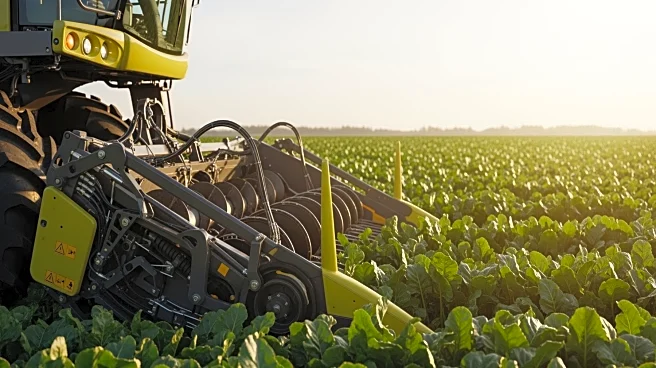What's Happening?
The global sugar beet industry is experiencing significant shifts due to various economic and environmental factors. Sugar beet, a key crop in moderate climates such as the United States, Europe, and China, is crucial for sugar and bioethanol production.
Recent trends indicate a plateau in the cultivation boom, with a focus on replacing and renewing harvesting machinery. The industry faces challenges from poor harvests, pest infestations, and rising energy costs, which have led to reduced acreage and increased prices. Despite these challenges, advancements in harvesting technology, such as multi-row, self-propelled machines, are being developed to improve efficiency and reduce soil damage. These machines are equipped with driver assistance systems and advanced sensors to optimize harvesting processes.
Why It's Important?
The developments in sugar beet harvesting have significant implications for the agricultural sector, particularly in the U.S. and other major beet-producing regions. The shift towards more efficient and technologically advanced harvesting methods can enhance productivity and sustainability in agriculture. This is crucial as the industry grapples with environmental challenges and market fluctuations. The innovations in harvesting technology not only aim to increase yield but also to reduce operational costs and environmental impact. This can lead to more competitive pricing and stability in the sugar market, benefiting both producers and consumers. Additionally, the integration of digital technologies in agriculture could set a precedent for other crops, promoting a broader adoption of smart farming practices.
What's Next?
As the sugar beet industry continues to evolve, stakeholders are likely to focus on further technological advancements and sustainability measures. The ongoing development of driver assistance systems and automation in harvesting machinery will likely continue, aiming to enhance efficiency and reduce labor costs. Additionally, there may be increased collaboration between machine manufacturers and research institutions to refine these technologies. Policymakers and industry leaders might also explore strategies to mitigate the impact of environmental challenges and market volatility. This could involve investing in research and development, as well as implementing policies that support sustainable agricultural practices.
Beyond the Headlines
The sugar beet industry's shift towards advanced technology and sustainability reflects broader trends in agriculture. The emphasis on reducing soil damage and improving efficiency aligns with global efforts to promote sustainable farming practices. This transition could have long-term benefits for environmental conservation and food security. Moreover, the integration of digital technologies in agriculture could lead to a more data-driven approach to farming, enabling better decision-making and resource management. As these technologies become more widespread, they could transform the agricultural landscape, making it more resilient to climate change and economic pressures.

















